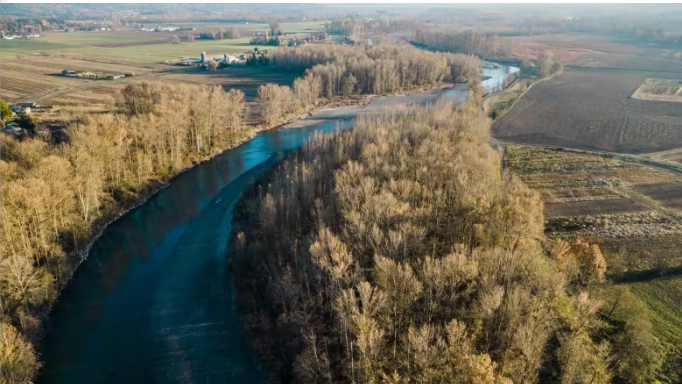The province has confirmed water of poor quality flowing through the Nooksack River in Washington state is coming from multiple sources in B.C. This comes a month after Washington farmers and officials called upon B.C. to investigate and address high levels of fecal bacteria coming from the Canadian side of the border. A joint letter sent in June from the Whatcom Family Farmers and the North Lynden Watershed Improvement District addressed to B.C. Premier David Eby and Washington Gov. Jay Inslee said routine water quality testing done by Whatcom County and the state's agriculture department found bacteria at levels over 200 times higher than the water quality standard.
High levels of E. coli bacteria close 2 Moncton lakes
The City of Moncton says Jones Lake and the lake at Centennial Park are closed to recreational use until further notice because of high E. coli counts. The city issued a public advisory Wednesday, saying routine testing found high counts of the fecal bacteria. The lakes are closed for swimming, kayaking, canoeing and other recreational activities, and dogs should not be allowed to swim in or drink the water.
No-swimming advisories issued for 4 N.B. beaches
If you're heading to a beach for a cool-down swim, make sure you check if there are any water-quality advisories in your area. A few beaches in New Brunswick have registered high levels of E. coli and enterococci as most of the province is under a heat warning, with temperatures in the low 30s but feeling like up to 40 C. Oak Bay Provincial Park near St. Stephen has had a no-swimming advisory in place for more than a week. Parlee Beach and Murray Beach near Moncton are both also not suitable for swimming.
Fecal bacteria in Chestermere Lake prompts advisory to stay out of the water
Alberta Health Services issued a water quality advisory on Friday for Chestermere Lake because of elevated levels of fecal bacteria. AHS says people should not swim or wade in the water at Anniversary Park Beach, Cove Park Beach or Sunset Park Beach, effective immediately. Contact with the water could result in gastrointestinal illness. Skin, ear and eye infections are also possible. Water-borne organisms, including fecal bacteria, can cause vomiting and diarrhea.
New study aims to uncover source of E. coli contamination in First Lake
Is it poop from humans, dogs, waterfowl or another source that keeps fouling the waters of First Lake in Lower Sackville, N.S.? That's one of the questions an upcoming study will tackle. The Halifax Regional Municipality is seeking a company to conduct a study to figure out how much fecal bacteria is in the lake and where it's coming from, as well as to make recommendations on how to decrease the pollution.
13 no-swim advisories at Parlee Beach over water quality so far this year
High fecal bacteria counts at New Brunswick's marquee beach have resulted in 13 days of no-swim advisories this year, the most at this point of the summer since test results have been publicly available. The advisories were issued because E. coli and enterococcus bacteria counts exceeded Canadian recreational water quality guidelines at the provincial park east of Shediac.
Elevated levels of fecal bacteria in Pigeon Lake prompts health warning
Alberta Health Services is warning the public of fecal bacteria in a lake southwest of Edmonton. Elevated levels of fecal bacteria were detected through testing lake water at Zeiner Park Beach at Pigeon Lake, located about 100 kilometres southwest of Edmonton, and AHS is advising people not to swim or wade in the water there. The current levels of bacteria could lead to gastrointestinal illness if someone swallows the water. Contact with the water could lead to skin, ear and eye infections, AHS says.
Students test Mersey River for bacteria with shocking results
A group of Grade 7 students delivered some shocking results to the Region of Queens Municipality council meeting December 22. The South Queens Middle School students had been working on a Social Studies project to test fecal bacteria, or enterococci, levels in the Mersey River. The students found readings of between 230 and 340 enterococci to 100 millilitres of water. Under Health Canada regulations, it is not advisable to swim in water where there is 70 enterococci/100 ml. And at 170 enterococci/100 ml, the water should not touch skin.
No-swimming advisories not stopping people from taking a dip at Parlee Beach
A no-swimming advisory during the entire New Brunswick Day weekend didn't stop beachgoers from taking a dip at Parlee Beach. Water samples turned up with high levels of fecal bacteria three days in a row — from water tested Thursday, Friday and Saturday. But the beach was busy, with lifeguards watching over it and many children swimming in the water.
Online magazine calls Parlee Beach one of the most polluted in the world
A recent article listing the popular destination as one of the dirtiest beaches in the world could keep people away from the beach if the weather improves. Word of its water quality issues is spreading.
“The Insider” is an online publication that compiles travel tips and information from different groups who travel the world. It has lumped the New Brunswick attraction with others from Senegal to India and Hawaii as among the most polluted on the planet.











